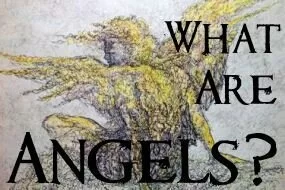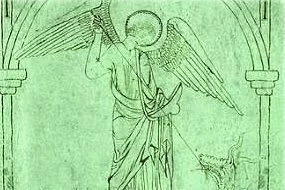 Angels, what are they?
Angels, what are they?
Many people hold beliefs in angels, and those beliefs can vary. From mysterious visitors to huge, winged beings of light, angels enthrall spiritual people. Let's take a look at our beliefs in angels, from biblical and religious references to what we suspect they really are after reviewing the evidence.
We think you will find our interpretation of angels, enlightened spirits, to be quite interesting.
The Meaning of the Term 'Angels'
The word angel in the original Hebrew and Greek languages means messenger. An angel is a spirit that brings a message. However, you and I are spirits and we too, can bring a message to one another. With that definition, let us first consider that an angel could be anyone who brings a message to another person or persons, no matter which side of the grave. For more on this interesting idea, read Angel of Death.
Angels According to Psychics
Angels are often confused with enlightened spirits because they are enlightened spirits, but they exist at a higher vibration, or estate, than spirits who are elevating. Allow us to explain. All spirits, all life, is growing, maturing, increasing in consciousness. The more we, human beings, comprehend about who we are as people, the higher we elevate in understanding; and, that is what we mean by vibration (think about light and sound being 'waves'). Because of being higher, or let's just say further along in their life path, angelic spirits are not always recognized in human form. Those who have learned to perceive angels often describe them as being shapes of colors because that is the best they are able to view them from the lower-in-vibration, earth plane. This idea is quite similar to how some people are able to detect the auras (energy pattern) of people. Others say they can "feel" the presence of angels when detecting them.
According to many sources, especially those who claim to communicate with angelic beings, angels are elevated spirits that may or may not have been in human form at one or multiple times. They may also choose to act as spirit guides and often remain nameless. Angels may also appear in a masculine or feminine form by choice.
Angels Found in the Bible
For the sake of Western beliefs, let's look at what we can find in the Bible about angels. After all, it is a collection of various manuscripts from different authors of antiquity. Jesus, we read, communicated quite a bit with angels, and that might provide us with some clues as to who they are. We are told in the New Testament that Jesus was watched over by angels, that he could call 10,000 angels if he needed them and that angels ascended and descended upon him. What does that mean? Jesus quoted and interpreted Genesis 28 to Nathanael (when Jacob saw a ladder extending from the earth to the heavens) in the following Bible passage:
"And he said unto him, Verily, verily, I say unto you, hereafter you shall see heaven open, and the angels of God ascending and descending upon the Son of man." - John 1:51
 Nathanael, we read, saw the miracles, physical signs as well as the enlightened words Jesus spoke as he communicated and worked with angels. This was further demonstrated later in the New Testament to other disciples and has been called the Mount of Transfiguration by Bible scholars:
Nathanael, we read, saw the miracles, physical signs as well as the enlightened words Jesus spoke as he communicated and worked with angels. This was further demonstrated later in the New Testament to other disciples and has been called the Mount of Transfiguration by Bible scholars:
"And after six days Jesus took Peter, James, and John his brother, and brought them up into an high mountain apart, and was transfigured before them: and his face did shine as the sun, and his raiment was white as the light. And, behold, there appeared unto them Moses and Elijah talking with him." Matthew 17:1-3
Let's assume that Jesus was rolling back the veil which covers the eyes of mankind, revealing what possibly occurs behind our physical world. In other words, he showed his trusted disciples the spirit world in action. The ascending and descending of messengers, or angels, is simply two-way communication between the spirit (unseen realm) and the physical world (earth). The messengers speak to us, as Moses and Elijah did with Jesus, and direct, guide and assist those on earth who are open to their communication. This is who Jesus was communicating with when he prayed to his heavenly Father. The word father in the Greek means ancestor, teacher, transmitter or generator. Moses and Elijah would certainly be spiritually enlightened teachers and guides - ancestors. The idea of ascension and descension would indicate the idea of high and low, communication between those in spirit and those on earth. What is more shocking to some is that the angels were revealed to be Moses and Elijah, disembodied humans who are still alive, in spirit and communicating with Jesus.
Further to this idea that angels are enlightened or elevated human spirits, we should also look to some additional biblical passages, writings from the ancients. It's intriguing to note that whenever angels are described in the Bible as bringing messages, they are always human in appearance. For example, when angels visited Lot (Genesis 19) before the destruction of Sodom, we know they appeared as men because they were called men:
"And there came two angels to Sodom at evening; and Lot sat in the gate of Sodom: and Lot seeing them rose up to meet them, and they (men of Sodom) called unto Lot, and said unto him, Where are the men which came unto thee this night?"
Names of Angels May Provide More Understanding
Angel names typically end in "el" which in Hebrew means, "God." But the name of one angel reveals what angels are: the name of the angel 'Gabriel' means "man of God." Now knowing this, take a look at the archangel Michael's name. His moniker translates to, "who is like God." Putting this together, we can perhaps draw another clue about angels: angels are men who are like God. In other words, angels can be enlightened, human spirits.
If Accurate, Jesus Told Us Who Angels Are
The following Bible verse clearly states that we are angels. Jesus explained the metaphor by proclaiming this in Matthew 22:30:
"For in the resurrection they (us) neither marry, nor are given in marriage, but are as angels in heaven."
Traditional Western religion might have you believe that this passage means that some of us will be only similar to the angels, but thats not what see Jesus revealing. Jesus seems to clarifying that we ARE the angels (other translations, especially of Luke 20:36, use the words equal to the angels) who have lost our first estate, meaning, while earthbound, we do not know who we really are. That would make the human race, in a sense, fallen angels. That could be why it was written that he said we will be like the angels (who are not fallen), one day; perhaps, Jesus was trying to help us comprehend an amazing truth: We are the fallen angels who have lost our way and will be restored. This restoration is the resurrection, which means a raising up from the dead. Symbolically, the Bible states that one third of the angels lost their former place and fell from the heavens. The heavens would represent the higher realm or "spirit." The fall would be moving away from light and truth and unto darkness, or perhaps, the fall would be our temporary appearance in this physical plane. (Darkness always represents being "lost" or "lack of knowledge" in the bible.) If those of us in physical bodies are the third of angels that fell from the heavens, then two thirds remain in the light. Perhaps, these angels bring messages to us, daily, and are waiting for us to "re-join" them. We read of them having rank or hierarchies, but maybe this is indicative of their elevation: what degree of enlightenment (understanding) they possess. Maybe, life is a journey that never ends - and that includes never-ending spiritual growth which is ascension (or elevation of knowledge).
Now that you know many angel names end with el, it's clear that angels hold an elevated status within the Bible and within many religions. We read that in the Bible ven Jesus was called, Immanuel (notice, again, the el) or God with us. Jesus' life had a simple yet hard (because it must be spiritually heard) to understand message; and it was not what religious institutions would teach you, today. This is why he was considered a radical in his day. His message was that religion has helped to blind us from the truth of who we really are and that each of us has the ability to communicate with those on the other side who are in spirit. These messengers, or angels, of whom you are also, are guiding and assisting all of mankind in understanding the truth. Jesus stated it his way: "The Kingdom of God is within you." That would indicate that eternal Spirit (think energy) is within all of us, and all of us are a part of that sole, eternal Spirit.
Looking at that 'el' word, again, in the Bible's Old Testament, we are called, Elohim, meaning 'gods.' Elohim is often incorrectly translated as God in the Old Testament Bible; but it's clear that people are the Elohim, the messengers, angels or gods on either side of the veil. Walking around as humans in physical bodies, unaware that we are gods, is precisely what Jesus was trying to proclaim in John 10:33-34:
"We are not stoning you for any of these, replied the Jews, but for blasphemy, because you, a mere man, claim to be God. Jesus answered them, Is it not written in your Law (believed to be given by God), 'I have said you are gods'?"
Jesus was quoting a passage from Psalm 82, where mankind is called gods. It is a passage that clearly shows all of us exist within God, or Spirit, as gods, but we do not know who we truly are and walk in darkness because of it:
"Gods stand in the congregation of God; He governs among the gods, they know not, neither do they understand; they walk to and fro in darkness: All the foundations of the earth are shaken. I said, You are gods, and all of you sons of the Most High. Nevertheless you shall die like men." - Psalm 82:1, 5-7
Angels who have fallen, all of mankind for that matter, will be resurrected unto understanding who we are. We will be rejoined with loved ones, though they are not far away and are with us, even now. This is the great mystery of who we are and what may await us in life.

